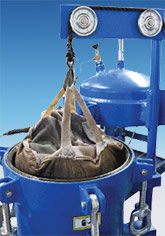Datasheets
Download:Varnish Removal
Varnish is the thin, insoluble film deposit that forms on oil-wetted surfaces inside a turbine lube system, including bearings and servo valves. It's formation is often attributed to higher operating temperatures, smaller fluid reservoirs, high cyclic service, and fluid base stocks that have lower solvency for varnish precursors.You can't see it, but you know it's there taking your hydraulics system down one component at a time.
When varnish forms in turbine oils, the effects can be devastating to the operation and availability of the equipment, and may include:
- Sluggish controls and servo valves stiction, which can lead to expensive repairs or replacement
- Costly downtime from unscheduled outages
- Start-up delays from unresponsive control systems
Pall Sentry™ Varnish Removal System
The Pall Sentry™ resin-based system is designed to efficiently remove varnish precursors from the oil. Doing this forces varnish deposits on metal surfaces back into the solution for further removal by the Sentry treatment skid. Treatment continues while the turbine operates, until the entire oil system is free of varnish, as shown by consistently low MPC value in the oil.Efficiency and Ease-of-Use
Other filtration/adsorption or electrostatic removal methods are very dependent on operating conditions such as operating temperature, cycling rates, and the chemical make-up of the oil.The Pall Sentry resin-based varnish removal skid can remove varnish precursors with greater reliability and efficiency because it is largely temperature independent and does not rely on mechanical interception of the varnish precursors.
The stand-alone system uses a specially formulated resin in a semi-dry package. The skid uses three resin bags stacked in the vessel, which can easily be changed and disposed of as varnish is removed.
Operation
The Pall Sentry fluid treatment system is connected to the main lube or control oil reservoir and circulates the fluid at a rate of 3 gpm (11.35 l /m) through the resin and a high-efficiency Pall Ultipleat® SRT particulate removal filter, the latest generation in machine lube protection. With each pass through the system, varnish precursors are removed and the fluid is returned to the reservoir. Once used, the resin bags can be easily replaced and disposed of.| Flow Rate: | 3.0 GPM (0 -11.36 LPM) |
| Inlet Pressure Range: | -14 in Hg to 10 psig (-0.47 bar to 0.69 bar) |
| Maximum Inlet Viscosity: | 500 cSt |
| Maximum System Pressure: | 80 psi (5.4 bar) |
| Maximum Fluid Temperature at Inlet: | 140 °F (59.4 °C) |
| Inlet Pump Pressure Relief Setting: | 80 psi (5.5 bar) |
| Outlet Pump Pressure Relief Setting: | 80 psi (5.5 bar) |
| Ambient Temperature Range: | 60 °F to 140 °F (16.6 °C to 59.4 °C) |
| Filter Change-out (both the bags & particulate): | 30 psid (1.8 bar) DP |
Dimensions1
| Height: | 72 in. (1829 mm) |
| Width: | 29 in. (737 mm) |
| Length: | 41 in. (1041 mm) |
| Dry Weight: | 660 lbs (297 kg) |
1 All dimensions are nominal.
Materials of Construction
| Item | Description |
| Vessel Material | Carbon steel |
| Vessel Surface Finish | Powder coated exterior, color Pall blue. Paint is compatible with phosphate esters. |
| System Seals | Fluoroelastomer or equivalent resistance to phosphate ester hydraulic fluid – i.e. Viton. |
| Electrical | Refer to the skid wiring diagram for power requirements. All electrical components within the system are rated NEMA 4. Wiring methods meet the requirements of NFPA 70. |
| Inlet/Outlet Connection Sizes | 1 ⁄2" |
Systems
Filter Housing Assembly Part Number : XFP [1] [2] [3] [4] [5] [6] [7] [8]
(Resin Bag Kit must be purchased separately.)
Replacement Element Part Number : UE219AS08Z
ß12(c) ≥1000 based on ISO 16889
(Resin Bag Kit must be purchased separately.)
Replacement Element Part Number : UE219AS08Z
Table 1:
| Code | Electrical Options |
| G 6 | 115 VAC 60 Hz 1P |
| M 5 | 220 VAC 50 Hz 1P |
| W 4 | 480 VAC 60 Hz 3P |
| 14 | 575 VAC 60 Hz 3P |
| T 3 | 415 VAC 50 Hz 3P |
| R 3 | 380 VAC 50 Hz 3P |
Table 2:
| Code | Filter Grade Options |
| AS | 12 microns |
ß12(c) ≥1000 based on ISO 16889
Other filter ratings available on request
Table 3:
| Code | Seal Options |
| Z | Fluorocarbon |
Table 4:
| Code | Mounting Options |
| C | Caster |
| N | Floor mount |
Table 5:
| Code | Connection Options |
| P | BSP |
| T | NPT |
Table 6:
| Code | Manufacturing Region |
| W | Americas |
| A | Asia |
| E | EMEA |
Table 7:
| Code | Language |
| EN | English |
| ES | Spanish |
| FR | French |
| PR | Portuguese |
Table 8: Fluid Used
| Code | Fluid Used |
| X1 | Synthetic fluid |
| X2 | Mineral oil |
| Replacement Resin Bag |
Part No. |
| Resin Bag Kit (complete set of three) | XBG-PGGKIT |
| Resin Bag (individual) | XBG-PGG |
We appreciate your review of this product. Please login to your account to leave a review.



